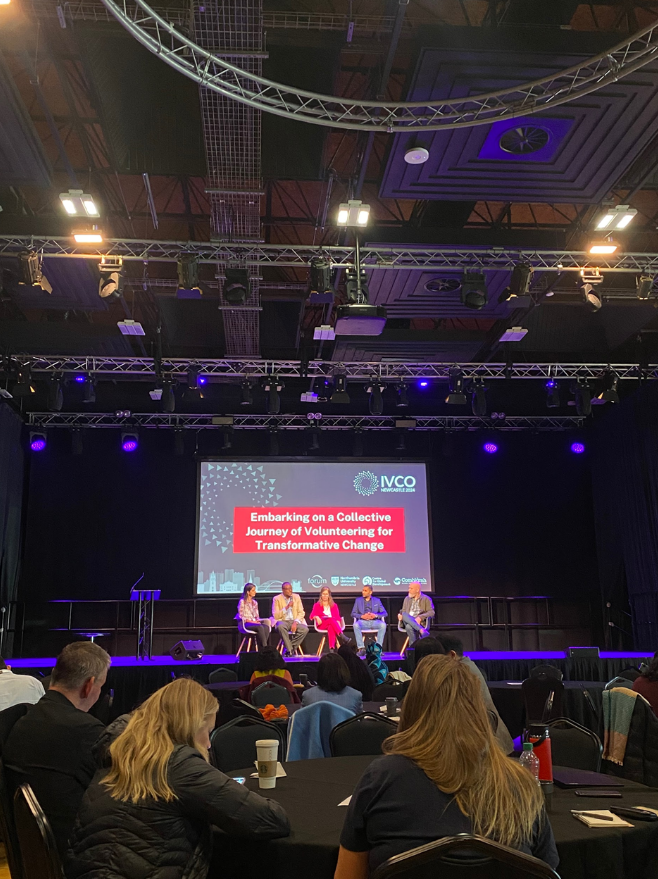Photo credits: Christine Frazer, Gateshead Community Bridgebuilders IVCO 2024 (9-13 September) in Newcastle Upon Tyne, United Kingdom
The IVCO conference was a 4-day long event that brought together representatives of partners and members of Forum from all around the world to discuss best-practices and share current projects. Representing CCIVS, I attended as a participant, with the purpose of researching what the current trends are in the sector, and what projects we may be interested in working on. The conference was very informative and I had the chance to participate in a number of workshops that gave the floor to various organisations to share their work.
One thing to note is that this was the first time that the IVCO conference was hosted by a university. The Northumbria University team was fantastic, and the event was organised by a number of PhD students who all research topics relevant to volunteerism. Upon further inquiry, I learned that Northumbria’s Department for Global Development (formerly changed from International Development) is one of the top in the world.
The conference theme was “Building & Sustaining Connections for Change: Volunteering for Solidarity”, and the term ‘solidarity’ played a very important role throughout the conference. There was extensive talk about what this term means. Something that I enjoyed about the conference was that other participants brought a diverse and critical lens to the term, although this remains a relatively recent topic of conversation when discussing IVS. For instance, one speaker in the Human Library session spoke about what volunteering means in Oceania, particularly in New Zealand, where the Maui people have a related, but very different term – ‘vā’ – which is engrained in the culture as a duty to help your community. This brought on the idea of the westernisation of the concept of ‘volunteering’, something that — under a different name or in a different context — has existed around the world since the dawn of time.
‘Bridge-building’ was one of the words that were frequently heard throughout the conference. This is an approach that resembles our own: viewing volunteering as a way to bring communities together from a multilateral approach, rather than from a top-down approach. One woman, a very inspiring key-note speaker at the conference, talked about her work as a ‘bridge builder’ in the nearby Gateshead community (across the bridge from Newcastle). One thing that she emphasised was the idea of “sharing a cup of tea” – a simple but effective way to create small and meaningful connections between people. Much like the things that we have been talking about as an organisation, she argued that we needed to change the idea of volunteerism from being about ‘helping’ people, to being about creating a conversation, talking to people, asking them what they need, sharing a cup of tea with them. She was quite a fresh face because she had a lot of experience in her own community working on bridge-building, and she brought some very interesting concepts to the table. For instance an interesting local initiative, called “Public Living Rooms” invited people from all over the community to come together and enjoy each other’s company, share their stories, along with a cup of tea. The concept was really beautiful.
One criticism I have from the conference was that there was not enough youth representation. I was one of five youth participants (under 30). While much of the conversation revolved around young people, who tend to be the key actors in volunteerism on the ground, very few young people were present to share their perspectives. To make matters worse, many of the participants (older and well established in their careers), made sweeping generalisations about young people, criticising the younger generations for only being on their phones, not wanting to do work or volunteer, having no interest in social justice or political participation, etc. They then complained that it is impossible to connect with the younger generations, which is understandable if they are approaching young people with these beliefs. These were baseless claims made in the same rooms as the only five young people who were given the chance to join. This is probably something that we should follow up with Forum, because CCIVS emphasises the importance of young voices (as seen with the creation of the Youth Committee). Therefore, this could be an interesting angle for CCIVS to approach as an organisation, to challenge these antiquated (and unhelpful) beliefs and ideas.

Photo credits: Dalia Michaud (CCIVS Youth Committee)
The IVCO24 conference was an excellent opportunity to discover new developments in the IVS sector. With a thematic focus on solidarity, there was discussion from NGOs and IOs around the world about how volunteerism can be made more accessible, inclusive and multilateral, challenging the outdated top-down approaches that have come to define volunteering. Some of the trending subjects for innovation included new models to follow-up with volunteers. Moreover, there was a focus on volunteerism as a means for building bridges between communities, and many speakers discussed how they implement this in their own organisations. CCIVS is a step ahead in this regard, as we have talked about bottom-up approaches and community bridge-building in volunteerism for some time, particularly through the Decolonise IVS! Project. Finally, after the success of our first Impact Report (2010-2020) there may be some exciting opportunities to pursue more research in the sector to use evidence-based strategies to legitimise volunteering for social justice.
Written by Dalia Michaud (CCIVS Youth Committee)

